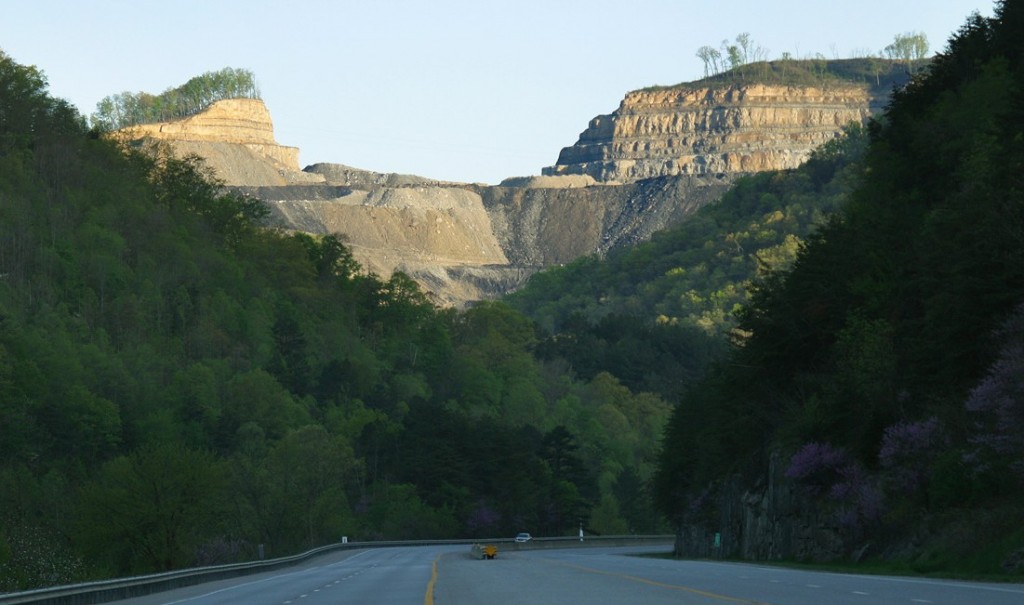Podcast: Play in new window | Download
Subscribe: RSS

This view of a former mountaintop in Pike County, Kentucky, which is now residing, in the form of dust, in the people who live nearby. Who is breaking the law, the people who did this or the people who protest it? (Photo by iLoveMountains.org/Flickr)
Here is what we have come to in America, nicely encapsulated in two events, one in California, the other in West Virginia. In California, another brazen demonstration that Big Oil is above the law, not merely when its toxic emissions sicken hundreds of people, but when it poisons the law enforcement officers sent to control them. In West Virginia, a clear reminder that should you think to petition your government for the redress of grievances, you may well find yourself below the law, left to ponder the true meaning of the First Amendment to the Constitution (freedom of speech, freedom to assemble, right to petition your government and so forth) in your jail cell.
On Thanksgiving Day in Charleston, West Virginia, activist Mike Roselle along with two colleagues was petitioning his state government for the redress of grievances caused by mountaintop-removal mining for coal. Every day (in West Virginia and Kentucky combined) five million pounds of explosives are detonated to obliterate mountains and make removal of the underlying coal easy for enormous machinery.
Resulting grievance number one: tons and tons of toxic silica dust, coating the homes and schools and hospitals and fields and gardens of the entire region. Two dozen peer-reviewed studies have found the dust to be toxic and a significant public-health risk. Even in the coal-friendly Congress, a bill to suspend mountaintop removal until the health issues have been analyzed has 45 co-sponsors.
Thanksgiving week, Roselle and his friend conducted a vigil and hunger strike on the steps of the West Virginia Capitol. Their intent was to draw attention and support to the bill, and to deliver to the governor a jar of the aforementioned dust, so the governor could have it analyzed by his own agencies and thus understand the threat to the people he is sworn to serve. Repeatedly, Roselle’s attempts to deliver the dust to someone responsible were rejected or ignored.
On Thanksgiving Day, he and his friend, with a camera person, moved to the governor’s mansion. He asked, via intercom at the entrance, for someone to receive the dust. What he got was a Capitol Police sergeant and a pair of State Police officers. He was polite, quiet, and compliant in everything but this: he would not pick up the jar of dust from the threshold of the entrance door, saying “I am not taking that dust back to Rock Creek,” from whence it came.
He is in jail in Charleston now, charged with trespass (on the doorstep of a residence provided by the taxpayers of West Virginia for a public official?) and with disorderly conduct. And what of his right to speak, to assemble, to petition for the redress of grievances? You might as well ask, what happened to the dust?
Meanwhile, out in California, Allenco Energy Company operates a small urban oil field in south Los Angeles. It was virtually played out, but in 2010, high oil prices brought it back to life, and it increased its output by 400 per cent. Constantly since then, hundreds of nearby residents have complained of headaches, nosebleeds dizziness, respiratory ailments and nausea from the foul odors wafting from the facility 24/7.
The complaints had their usual effect. (Did I mention that the words “affordable housing” are used in most of the news accounts of the neighborhood?) For example, LA air-quality officials in 2011 took three samples — count them. three! One more and we could call it many! — and proclaimed the air safe to breathe. The same thing the EPA did at ground zero in New York after 9/11.
The increasing numbers of people getting sick and complaining prompted an on-site inspection by EPA officials on November 8. They were overcome by fumes. “I’ve been to oil and gas production facilities throughout the region, but I’ve never had an experience like that before,” a top EPA official said. “We suffered sore throats, coughing and severe headaches that lingered for hours.”
Funny story. Now here’s the punch line. Nothing happened to Allenco Energy. Senator Barbara Boxer demanded that they be shut down. Nothing happened to them. Two weeks went by with Allenco letting the good times roll, and nothing happened to them. Then, on November 22nd, the company, to which nothing had yet happened, announced that it was voluntarily shutting down production in order, said President Peter Allen, “to appropriately address any concerns.” You know. If there are any.
The chief air quality enforcement officer for the region said he thought Allen seemed sincere. Said it was unusual that anybody ever did anything “in response to concerns.”
In a world worth living in, President Allen would be in jail charged with trespass on the health and welfare of thousands of people, not to mention disorderly conduct of a dangerous business. And Mike Roselle? Nothing would have happened to him.
It seems might always trumps right everywhere (except maybe in Bhutan and the Scandinavian countries at present). In places like CHINA I’m absolutely sure you would find far worse examples of such things and far more of them. Oh, wait, you wouldn’t, because the authorities there would do everything they could either to hide the atrocities from your sight or, failing that, to shut you up.
Such is the wretched inheritance of our species.